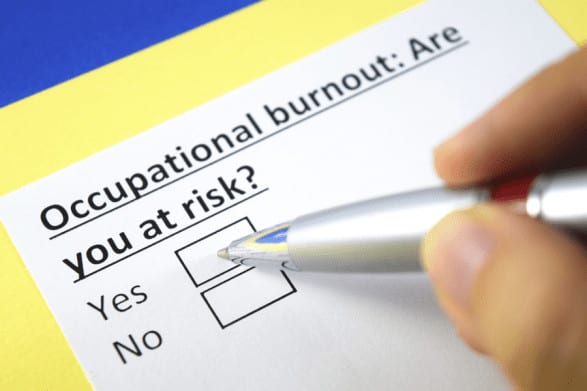- in Blog , Human Resources , Research by David Wilkinson
- |
- 1 comments
2 things predict if you will get work burnout: your personality isn’t one of them

How likely are you to suffer from work burnout? A series of new studies looking at what predicts work burnout in staff have just been published and they all point to just two things that makes all the difference.
One study just published in the International Journal of Stress Management looked at a range of factors thought to be involved in work burnout.
What is work burnout?
Work or organisational burnout is considered to be a form of stress that is characterised by feelings of:
- Exhaustion,
- A lack of enthusiasm,
- Reduced motivation and
- Reduced effectiveness.
Burnout is also often accompanied by
- Cynicism,
- Frustration,
- Avoidance,
- Being easily distracted and
- disengagement.
Burnout is considered to be the complete opposite of engagement.
The researchers in this study looked at a range of potential factors that have been thought to be contributors to burnout. In particular, they looked at job characteristics such as tenure, position, the type of role or job, the educational level of the individual as well as their personality type, previous experience of stress and their level of emotional intelligence.
The study was split into two phases each looking at 1,230 and 2,209 employees.
Conducting a SEM analysis, which is a form of factor analysis, the researchers found that only two factors were significant predictors of burnout.
Get the full research briefing

To get the full briefing and all the references just fill in the form and we will email it straight to you.
The two reliable predictors of work burnout
- The first, unsurprisingly, is that the level and duration of stress an individual experiences is an accurate predictor of burnout. The higher the level of stress experienced and the longer they are stressed, the more likely an individual is to burnout.
- Secondly, the higher the level of emotional intelligence, coupled with the ability to regulate their emotions (emotional resilience), the less likely an individual is to experience burnout.
All of the studies published this year have all come to very similar conclusions.
Other factors like personality, educational level, type of job, previous experience of stress etc. do not reliably predict whether someone will burnout.
The role of emotional intelligence and emotional resilience (regulation)
This research together with a number of other recent studies is that emotional intelligence and emotion regulation (emotional resilience or the ability to be able to change your emotions at will) appears to be the only reliable antidote to burnout and to offsetting the effects of stress.
However all the studies concluded that the best antidote was to identify as early as possible and prevent the causes of stress as well as developing greater levels of emotional intelligence and emotion regulation/resilience skills across the organisation.
References -to get hold of all the references and a pdf copy of the full research briefing fill in the form and we will send it to you right now
Get the full research briefing

To get the full briefing and all the references just fill in the form and we will email it straight to you.


